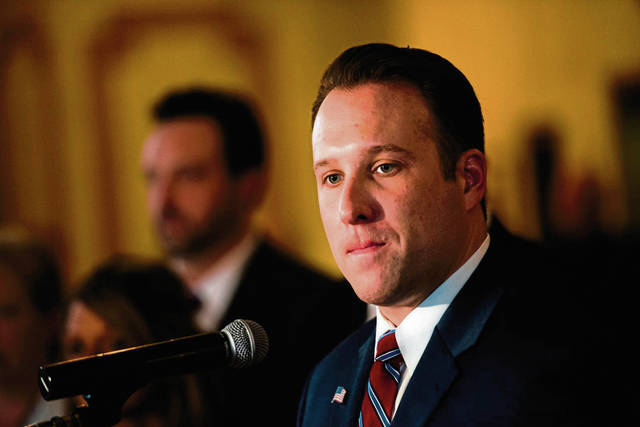Sean Kertes says he first began to notice a slight tightness in his chest two days before New Year’s Day.
The 34-year-old Westmoreland County commissioner tried to brush off his concerns as he went about activities in his Greensburg home, like taking down the Christmas tree and putting away decorations.
He had recovered from a mild bout of covid-19 several weeks earlier. But this was something entirely new. He was exhausted and short of breath at the slightest exertion — and everyday things seemed to be getting worse.
By Sunday evening, Jan. 3, when his resting pulse kicked up above 143, his wife, Ashley, insisted Kertes head to the emergency room at Excela Health Westmoreland Hospital. Doctors admitted him overnight after finding he was suffering from a pulmonary embolism, the medical term for a blood clot in the lungs.
Kertes, a healthy, active young man with no underlying medical conditions, was prescribed Warfarin, a common prescription blood thinner, and released the following day.
He since has learned he’s joined the ranks of a subset of covid-19 patients who suffer health complications related to the virus weeks or months after battling it and, in some instances, appearing to make a full recovery.
Although he was back on the job in his courthouse office Monday, Kertes said he is dealing with the impact of his post-viral symptoms. After a trip to a pulmonologist last week, he learned he still has three small blood clots in his lungs. His heart rate continues to be unusually high.
“I can’t go up two flights of steps without being short of breath. I used to drink 12 cups of coffee a day, and now I can’t drink even one because it boosts my heart rate so much. They think it may have affected my heart, so I’m seeing a cardiologist,” he said.
Experts are just now studying the mysterious array of conditions that can attack even those with mild symptoms of covid-19 days or weeks after recovery. A survey by the World Health Organization in the fall found as many as 1 in 5 previously healthy individuals ages 18 to 34 reported lingering symptoms related to the virus.
Some, like Kertes, initially recovered after experiencing only minor symptoms, only to find themselves in the doctor’s office or emergency room with new issues related to the infections. Others, like Kristin Giron Stewart, a 47-year-old Lower Burrell woman who was hospitalized for 13 days last summer, have battled lingering effects of the virus for months before being able to return to their normal activities.
Post-covid problems
Dr. Carol Fox, chief medical officer of Excela Health System, said the virus affects everyone differently. Patients such as Kertes are showing up in doctors’ offices and emergency rooms across the region more frequently, she said.
“We know that increased clotting is a potential aftermath,” Fox said.
Some patients who are hospitalized for covid-19 are sent home on blood thinners in an effort to head off the type of scares Kertes faced.
Dr. Amesh Adalja, a Pittsburgh-based infectious disease expert and a senior scholar at the Johns Hopkins Center for Health Security, said physicians have scoring systems that help them determine when it would be wise to put post-covid patients on drugs designed to fight clotting or, alternatively, bleeding — another post-covid symptom that has affected some survivors.
“It’s not routine that everyone who is discharged is put on blood thinners post-covid,” Adalja said. “You have to weigh the risks and the benefits.”
He said factors that might weigh into such decisions include whether a patient’s age and prior medical history suggest such issues could be problematic.
Kertes said there was nothing in his medical history to suggest he might have been a candidate for such complications.
“I try to stay fit. I’ve never been on medication, never had surgery and had no underlying conditions. For me to go from that to being exhausted all the time is just frightening,” he said. “I’d tell anyone if you don’t feel right, go to the doctor or the emergency room. That’s what they are there for.”
Dr. Alison Morris, chief of Pulmonary, Allergy and Critical Care Medicine at UPMC and a professor of medicine, immunology and clinical and translational research at the University of Pittsburgh, is heading UPMC’s Post-Covid Recovery Clinic. Researchers there have seen instances of blood clots, as well as unusual bleeding among some patients.
“In conjunction with the clinic, we are doing a research registry on symptoms and long-term impacts and trying to look at blood samples to predict who gets what complications, what might be causing them and how we can intervene,” Morris said. “It is something we still are learning about as the pandemic progresses. It is important to look at this in comparison to the general population.”
Morris said patients still dealing with post-covid symptoms three months after diagnosis can contact the clinic by calling 412-648-6161, then press 2.
While scientists and physicians are continuing to learn about the impact of the virus, one thing has become clear with growing reports of post-covid symptoms, Adalja said.
“There is going to be a burden of illness for those who are going to come back and require treatment for medical conditions,” he said. “This is going to be a long tail of conditions that we’re going to be dealing with for some time.”
Covid complications
According to the U.S. Centers for Disease Control and Prevention, common post-covid symptoms that can linger for weeks or crop up after even mild cases of the virus include:
- Fatigue
- Shortness of breath
- Cough
- Joint pain
- Chest pain
Other reported long-term symptoms include:
- Difficulty with thinking and concentration (sometimes referred to as “brain fog”)
- Depression
- Muscle pain
- Headache
- Intermittent fever
- Fast-beating or pounding heart (also known as heart palpitations)
More serious long-term complications appear to be less common but have been reported. These have been noted to affect different organ systems in the body. These include:
- Cardiovascular: inflammation of the heart muscle
- Respiratory: lung function abnormalities
- Renal: acute kidney injury
- Dermatological: rash, hair loss
- Neurological: smell and taste problems, sleep issues, difficulty with concentration, memory problems
- Psychiatric: depression, anxiety, changes in mood








